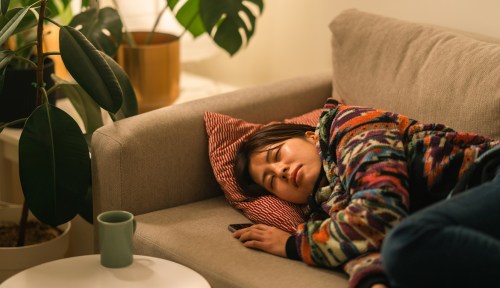Our editors independently select these products. Making a purchase through our links may earn Well+Good a commission
I’m convinced there’s something literally sedative about my couch once the sun goes down. If I so much as sit on it after dinner, I’m lights-out in a few minutes. Within a half hour or so, I’ll be jolted awake by the TV or my partner (or maybe even my body’s inner intuition that I need to actually get ready for bed) and switch over to my bed after brushing my teeth. But once I’m actually in bed, dozing off again is never as easy.
Experts in This Article
board-certified physician, certified sleep specialist, sleep coach, and founder of The Solution is Sleep
clinical psychologist, sleep specialist, author of The Women’s Guide To Overcoming Insomnia, and Director of Sleep Health at Sleepopolis
Sound like you? As it turns out, this common tendency of napping before bed can seriously get in the way of your nighttime sleep, experts say.
Consider that napping before bed is much like snacking before a meal, says psychologist and sleep specialist Shelby Harris, PsyD, author of The Women’s Guide To Overcoming Insomnia. That’s because our drive for sleep operates in a similar way to our drive for food. Just as snacks can stave off your hunger, naps can help mitigate feeling tired. But too close to bed, that can backfire.
“When we wake up in the morning, we are essentially ‘full’ from a night of sleep,” says Dr. Harris. “As time goes by, we build up more and more of an appetite for sleep so that come bedtime, we’re really hungry for sleep and then have a big ‘meal’ of sleep throughout the night. But if you nap close to bedtime, you’re ‘snacking’ on sleep—which can make it harder to fall or stay asleep once you actually go to bed.”
“If you nap close to bedtime, you’re ‘snacking’ on sleep—which can make it harder to fall or stay asleep once you actually go to bed.” —Shelby Harris, PsyD, psychologist and sleep specialist
Of course, if you’re tired enough or sleep-deprived, you might not notice as big of a negative effect on your nighttime sleep from napping on the couch before bed. In that case, the sleep snack is like a small appetizer: It doesn’t fully destroy your appetite for the main course.
On the flip side, however, going overboard on the sleep snack can totally diminish your sleepiness, in just the same way that a hefty appetizer can squash your appetite. Perhaps your overall hunger for sleep wasn’t as big to begin with, or you dozed on the couch for a good couple hours before waking up to get ready for bed. In those cases, you may find it much more difficult to fall asleep and get a good-quality night of sleep after the fact.
Why it’s so easy to fall into the trap of napping on the couch before bed
Even if you understand that napping before bed will make it harder to sleep at night, it can feel so easy to do it anyway. And there’s a psychological reason for that (yes, beyond the fact that your couch is just super comfortable).
When you’re lying on the couch in the evening, you’re likely not “trying” to sleep, which can allow your naturally high sleep drive (at this point in the day) to take over and sleep to come passively, says sleep specialist Angela Holliday-Bell, MD. “Doing a relaxing or low-stimulating activity like watching television can also make it that much easier to transition into sleep during this timeframe,” she says. Add in the dip in your circadian rhythm that happens in the evening a few hours before your usual bedtime, coupled with the natural sleepiness that can follow a meal, and it’s no wonder the post-dinner couch snooze can be so alluring.
The more you nap before bed, though, the more your body will begin to associate your couch with sleep—and your bed with the wakefulness that follows, says Dr. Harris. That can make it all the more difficult to fall asleep once you’ve switched over to the bed from the couch.
At that point, instead of allowing sleep to come passively (as you likely had no problem doing on the couch), there’s a tendency to get anxious about how awake and alert you may feel, says Dr. Holliday-Bell. Remember, you’ve likely lost some of your hunger or drive for sleep through napping. It’s also possible that exposure to the bright light of your bathroom while you were getting ready for bed woke you up even further by “delaying or decreasing your body’s release of melatonin,” says Dr. Holliday-Bell. In either case, though, feeling anxious about being able to fall back asleep once in bed can, ironically, just keep you awake even longer, she says.
To avoid that spiral, it’s best to set yourself up for maximum sleepiness once your head hits the pillow. That means steering clear of napping before bed, if you can, in order to both maintain your sleep drive for the long stretch of nighttime sleep and secure the psychological connection between bed and sleep. “I always tell my clients, ‘The bed should only be used for sleep and for sex, and the couch should be reserved for wakeful activities,’” says Dr. Harris.
Sign Up for Our Daily Newsletter
Get all the latest in wellness, trends, food, fitness, beauty, and more delivered right to your inbox.
Got it, you've been added to our email list.











